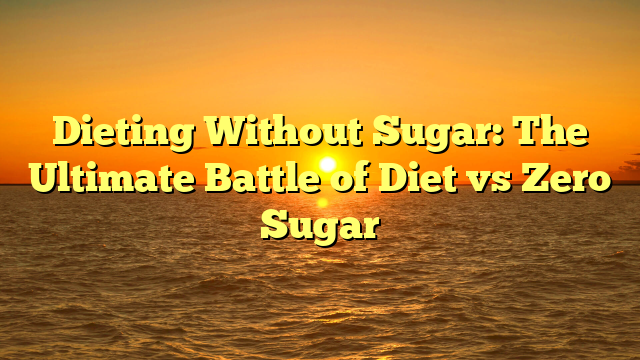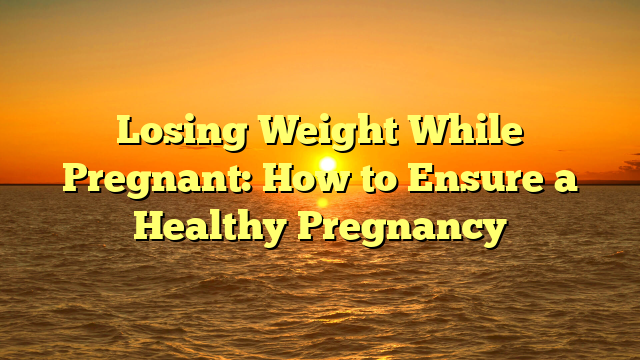Dieting Without Sugar: The Ultimate Battle of Diet vs Zero Sugar
Diet vs Zero Sugar… that is the question. You’ve decided to take on the ultimate battle of dieting without sugar. It’s a tough road ahead, but you’re determined to conquer it. In a world where sugar seems to be lurking in every corner, the challenge lies in finding alternatives and making smart choices. This article will guide you through the pros and cons of cutting out sugar from your diet, and explore the different approaches you can take to maintain a healthier lifestyle. From the latest fad diets to embracing sugar substitutes, get ready to embark on a journey towards a sugar-free future.

The Hidden Dangers of Sugar in Our Diets
We all know that consuming excessive amounts of sugar is not good for our health, but the reality is that it can be a hidden danger lurking in our diets. Sugar is often added to many processed foods and drinks, making it easy to consume without even realizing it. The silent culprit of weight gain, sugar can wreak havoc on our bodies in more ways than one. Let’s explore the impact of excessive sugar intake on our health and how we can break free from sugar addiction.
Sugar: The Silent Culprit of Weight Gain
If you’ve ever wondered why it’s so difficult to lose weight, sugar may be to blame. When we consume sugar, it gets converted into glucose and enters our bloodstream, causing a spike in our blood sugar levels. This spike triggers the release of insulin, a hormone that helps regulate blood sugar. However, when there is an excessive intake of sugar, our bodies struggle to process it all, leading to insulin resistance.
Insulin resistance not only contributes to weight gain but also increases the risk of developing chronic diseases such as type 2 diabetes and heart disease. Additionally, sugar consumption stimulates the production of the hormone leptin, which controls hunger and tells our brains when we’re full. However, excessive sugar intake can lead to leptin resistance, making it harder for our bodies to recognize when we’re truly satisfied, ultimately leading to overeating and weight gain.
The Impact of Excessive Sugar Intake on Health
Beyond weight gain, excessive sugar consumption can have a detrimental impact on our overall health. Studies have shown that a high-sugar diet is strongly associated with an increased risk of chronic diseases such as obesity, diabetes, cardiovascular disease, and even some cancers. Consuming too much sugar can also lead to inflammation in the body, which is linked to various health conditions like arthritis, autoimmune diseases, and even mental health disorders.
Moreover, sugar has no nutritional value and is often referred to as “empty calories.” This means that it provides no essential vitamins or minerals, leaving our bodies lacking the nutrients they need to function optimally. Excessive sugar intake can also contribute to the development of non-alcoholic fatty liver disease, which can lead to liver damage and impair its ability to process fats and toxins.
Sugar Addiction: Breaking the Cycle
Sugar can be highly addictive, which makes it even more challenging to cut it out from our diets. When we consume sugar, our brains release dopamine, a feel-good chemical that creates a sense of reward and pleasure. Over time, this can lead to a dependency on sugar, similar to how one can become addicted to drugs or alcohol.
To break free from sugar addiction, it’s important to recognize the signs, such as cravings and mood swings, and take proactive steps towards reducing our sugar intake. Gradually reducing sugar in our diets rather than going cold turkey can make the transition more manageable. Finding healthier alternatives and incorporating natural sweeteners can help satisfy our cravings without the negative side effects of excessive sugar consumption.
Diet vs Zero Sugar: The Benefits of Cutting Out Sugar from Your Diet
Cutting out sugar from our diets may seem like a daunting task, but the benefits it brings are worth the effort. Let’s explore some of the key advantages of adopting a zero sugar lifestyle.
Weight Loss and Improved Metabolism
One of the most significant benefits of cutting out sugar is weight loss. By eliminating sugary drinks and foods, we reduce our overall calorie intake and give our bodies a chance to burn stored fat. Additionally, reducing sugar helps improve our metabolism, as insulin resistance decreases and our bodies become more efficient at processing nutrients and maintaining a healthy weight.
Reduced Risk of Chronic Diseases
Excessive sugar consumption is strongly linked to several chronic diseases, including type 2 diabetes, heart disease, and certain cancers. By cutting out sugar, we significantly reduce our risk of developing these conditions. Maintaining stable blood sugar levels also supports a healthy cardiovascular system and helps protect against insulin resistance.
Improved Energy Levels and Mental Clarity
Although sugar may provide quick energy spikes, it often leads to crashes and feelings of fatigue. By cutting out sugar, we promote more stable energy levels throughout the day, avoiding the typical highs and lows associated with sugar consumption. Additionally, reducing sugar can lead to improved mental clarity and cognitive function, helping us stay focused and sharp.
Better Dental Health
Sugar is a major contributor to tooth decay and cavities. When we consume sugary foods and drinks, the bacteria in our mouths feed on the sugars, producing acid that erodes tooth enamel. By cutting out sugar, we protect our teeth and gums, reducing the risk of dental issues and promoting better overall oral health.
The Challenges of Diet vs Zero Sugar
While there are numerous benefits to cutting out sugar from our diets, it’s important to acknowledge the challenges that come with it. Dieting without sugar can be a difficult task, as sugar is often hidden in many foods and beverages, making it hard to avoid completely. Let’s explore some of the challenges one may face when embarking on a zero sugar journey.
Withdrawal Symptoms and Cravings
When we suddenly reduce or eliminate sugar from our diets, our bodies can go through withdrawal symptoms, similar to those experienced when quitting certain substances. These symptoms can include headaches, mood swings, fatigue, and intense cravings for sugary foods. Overcoming these challenges requires patience, determination, and finding healthier alternatives to satisfy cravings.
Navigating Hidden Sugars and Artificial Sweeteners
Sugar hides in many processed foods and drinks under various names, such as sucrose, high fructose corn syrup, and dextrose. Additionally, many products marketed as “sugar-free” often contain artificial sweeteners, which can also have negative health effects. Navigating these hidden sugars and finding healthier options can be a learning process, requiring careful label reading and choosing whole, unprocessed foods whenever possible.
Social Implications and Lifestyle Changes
Dieting without sugar can also have social implications and require changes in our daily routines. Social gatherings often revolve around sugary treats and beverages, making it challenging to stick to a zero sugar plan. It may require open communication with friends and family about your goals and finding alternatives that still allow you to participate in social activities without compromising your progress.
Foods to Avoid on a Zero Sugar Diet
When following a zero sugar diet, it’s essential to be aware of the foods and drinks that should be eliminated or minimized. Let’s take a look at some categories of items to avoid.
Sugary Beverages and Fruit Juices
Sodas, energy drinks, sweetened teas, and fruit juices are high in added sugars and offer little to no nutritional benefits. These sugary beverages can quickly add up in terms of calories and contribute to weight gain. Opt for water, unsweetened herbal teas, or sugar-free alternatives instead.
Processed Foods and Snacks
Many processed foods, such as cookies, pastries, candies, and sugary cereals, are loaded with added sugars. These foods often provide little nutritional value and are high in empty calories. Opting for whole, unprocessed foods like fruits, vegetables, lean proteins, and whole grains can help support a zero sugar lifestyle.
Condiments and Salad Dressings
Condiments and salad dressings may seem innocent, but they can be packed with hidden sugars. Ketchup, barbecue sauce, and even some salad dressings often contain added sugars. Reading labels carefully and opting for homemade dressings or using olive oil and vinegar can help avoid unnecessary sugar consumption.
Sweetened Dairy Products
Yogurts, flavored milk, and certain dairy desserts often contain added sugars. While dairy can still be a part of a balanced diet, it’s important to choose unsweetened or naturally sweetened alternatives, such as plain Greek yogurt or milk without added sugars.
Healthy Alternatives to Sugar
Cutting out sugar doesn’t mean giving up on sweetness altogether. There are various healthy alternatives that can be incorporated into a zero sugar diet, providing natural sweetness without the negative effects of excessive sugar consumption. Let’s explore some of these options.
Natural Sweeteners: Stevia and Monk Fruit
Stevia and monk fruit are two natural sweeteners that can be used as alternatives to sugar. They are both non-caloric and do not raise blood sugar levels, making them suitable options for those following a zero sugar lifestyle. Stevia and monk fruit can be used in baking, cooking, or adding sweetness to beverages without compromising taste.
Fruit as a Source of Natural Sweetness
Fruits are nature’s sweet treats, packed with essential vitamins, minerals, and fiber. Opting for fresh or frozen fruits can satisfy cravings for sweetness without the negative effects of added sugars. Berries, apples, and citrus fruits are great choices as they have a lower sugar content compared to tropical fruits.
Using Spices and Flavorings
Spices such as cinnamon, nutmeg, and vanilla extract can add natural sweetness and depth of flavor to dishes without the need for sugar. They can be used in baking, cooking, and even in beverages to enhance taste and reduce the desire for added sugars. Experimenting with different spices and flavorings can open up a whole new world of delicious, sugar-free options.
Creative Substitutions in Baking and Cooking
When it comes to baking and cooking without sugar, it’s all about finding creative substitutions that maintain taste and texture. For example, mashed bananas or unsweetened applesauce can be used as a natural sweetener and binder in baked goods. Nut butters and coconut oil can also add richness and moisture to recipes. Exploring sugar-free recipes and experimenting with different ingredients can lead to delicious, guilt-free creations.

Creating a Sustainable Zero Sugar Lifestyle
Adopting a zero sugar lifestyle goes beyond simply cutting out sugar from our diets. It requires creating sustainable habits and making informed choices in all aspects of our lives. Let’s explore some strategies for successfully transitioning to and maintaining a zero sugar lifestyle.
Reading Labels and Making Informed Choices
One of the most important skills to develop when adopting a zero sugar lifestyle is reading labels and understanding the ingredients in our food. Paying attention to the sugar content, as well as the different names sugar can be listed under, helps us make more informed choices and avoid hidden sugars.
Meal Planning and Preparation
Meal planning plays a crucial role in maintaining a zero sugar lifestyle. By planning meals and snacks in advance, we can ensure that we always have healthy, sugar-free options available. Meal prep can also help reduce the temptation to reach for sugary convenience foods when we’re short on time or feeling hungry.
Finding Support and Accountability
Embarking on a zero sugar journey can be challenging, so finding support and accountability can make a significant difference. Whether it’s joining a support group, enlisting a buddy with similar goals, or seeking professional guidance from a registered dietitian or nutritionist, having someone to share the journey with can provide motivation, encouragement, and accountability.
Staying Motivated in the Long Run
Maintaining motivation is crucial for long-term success with a zero sugar lifestyle. Celebrate small victories, set realistic goals, and find ways to stay inspired. Whether it’s tracking progress, seeking out new recipes, or reminding yourself of the health benefits, finding what motivates you personally can help you stay committed to your sugar-free journey.
Overcoming Obstacles and Maintaining Discipline
While a zero sugar lifestyle can bring about numerous benefits, it’s not without its challenges. Overcoming these obstacles and maintaining discipline are key to long-term success. Let’s explore some strategies for tackling common hurdles.
Dealing with Sugar Cravings and Mindset Challenges
Sugar cravings can be intense, especially in the beginning stages of cutting out sugar. It’s important to have a game plan for when cravings strike. Stocking your pantry with healthy alternatives, distracting yourself with other activities, and reminding yourself of your goals can help you overcome cravings and avoid giving in to temptation.
Additionally, mindset challenges and negative self-talk can hinder progress. Being mindful of your thoughts and replacing them with positive, empowering affirmations can support your journey and help you stay focused on the bigger picture.
Recognizing and Avoiding Triggers
Identifying triggers that lead to excessive sugar consumption is crucial for maintaining discipline. Whether it’s stress, boredom, or being in certain environments, recognizing these triggers allows you to develop strategies to avoid or cope with them. Finding healthier ways to deal with stress, such as exercise or meditation, can help break the cycle of relying on sugar for comfort.
Managing Emotional Eating and Stress
Emotional eating is a common response to stress, sadness, or other intense emotions. It’s important to develop alternative coping mechanisms to deal with emotions without turning to sugar. Engaging in activities like journaling, talking to a friend, or practicing mindfulness can help manage stress and emotional eating in a healthy way.
Building Resilience to Stay on Track
Building resilience is key to staying on track with a zero sugar lifestyle. There may be setbacks or times when you give in to temptation, but it’s important not to let that derail your progress. Instead, learn from those moments and use them as opportunities for growth. Remember that every day is a new day to make healthier choices and continue working towards your goals.

Listening to Your Body: Moderation and Balance
While adopting a zero sugar lifestyle is beneficial for many, it’s important to listen to your body’s unique needs and find a balance that works for you. Some individuals may thrive on a completely sugar-free diet, while others may find that incorporating modest amounts of natural sugars, such as those found in fruits, suits their bodies better.
Understanding Your Individual Needs and Thresholds
Understanding your individual needs and thresholds is crucial when it comes to finding the right balance. Pay attention to how your body responds to different foods and adjust your approach accordingly. Some individuals may need to limit sugar intake more strictly to achieve health goals, while others may find that moderation is key.
Treating Yourself Occasionally without Guilt
Even on a zero sugar lifestyle, it’s important to allow yourself occasional treats without feeling guilty. The key is to indulge in moderation and choose healthier alternatives whenever possible. For special occasions or as a treat, opting for homemade sugar-free desserts or dark chocolate with a higher cocoa content can satisfy cravings without derailing progress.
Finding Balance Between Health and Enjoyment
Maintaining a balance between health and enjoyment is essential for long-term success. While it’s important to prioritize your health and reduce sugar intake, it’s also important to enjoy the journey and find pleasure in nourishing your body. Finding joy in cooking, exploring new sugar-free recipes, and savoring the flavors of whole, unprocessed foods can help you find that balance.
Combining Diet and Exercise for Optimal Results
While cutting out sugar from your diet can have significant benefits, combining it with regular exercise can enhance those results even further. Let’s explore how diet and exercise can work together for optimal health and well-being.
The Role of Exercise in Weight Loss
Exercise plays a vital role in weight loss by increasing calorie expenditure and building lean muscle mass. When combined with a healthy, zero sugar diet, exercise helps boost metabolism, improves body composition, and enhances overall fitness levels. Regular physical activity also provides numerous mental health benefits, such as stress reduction and improved mood.
Choosing the Right Physical Activities
Choosing the right physical activities largely depends on your personal preferences, fitness level, and goals. Whether it’s cardio exercises like running, cycling, or swimming, or strength training with weights and resistance bands, finding activities that you enjoy and can incorporate into your routine consistently is key. It’s important to start gradually and work your way up to more intense workouts as your fitness improves.
Fueling Your Workouts without Sugar
Fueling your workouts without sugar is essential for maintaining energy levels and optimizing performance. Instead of relying on sugary sports drinks or energy gels, opt for natural alternatives. For shorter workouts, water should be sufficient for hydration. For longer or intense workouts, consider natural electrolyte replacements or homemade energy snacks made with nuts, seeds, and dried fruits.
The Importance of Recovery and Rest
Rest and recovery are just as important as exercise when it comes to achieving optimal results. Allow your body time to recover between workouts, and aim for quality sleep to support muscle repair and overall well-being. Incorporating relaxation techniques such as stretching, yoga, or meditation can also promote recovery and help you feel refreshed and ready for your next workout.
Seeking Professional Guidance and Support
While adopting a zero sugar lifestyle can be challenging, seeking professional guidance and support can significantly increase your chances of success. Let’s explore some resources that can provide valuable assistance on your journey.
Consulting with a Registered Dietitian or Nutritionist
A registered dietitian or nutritionist can provide personalized guidance and support when it comes to cutting out sugar and creating a sustainable meal plan. They have the expertise to design a diet that meets your individual needs, taking into consideration any health conditions, dietary restrictions, or personal goals. They can also provide ongoing support, accountability, and help you navigate challenges along the way.
Joining Support Groups or Online Communities
Joining a support group or online community of individuals with similar goals can provide a sense of belonging and encouragement. Connecting with others who are going through or have gone through the same challenges can be incredibly helpful. These groups can offer tips, inspiration, recipe ideas, and a safe space to share your journey, setbacks, and successes.
Customizing a Zero Sugar Plan for Your Needs
Every individual is unique, and what works for one person may not work for another. Customizing a zero sugar plan to suit your specific needs, tastes, and lifestyle is crucial for long-term success. Experimenting with different strategies, seeking professional guidance, and listening to your body’s cues will help you develop a plan that works best for you.
In conclusion, the hidden dangers of sugar in our diets are extensive, and its impact on our health cannot be underestimated. By understanding the risks associated with excessive sugar consumption, adopting a zero sugar lifestyle, and approaching it with knowledge and support, we can break free from the cycle of sugar addiction and enjoy the many benefits of a healthier, sugar-free life. Remember, it’s a journey, and every step you take towards reducing your sugar intake is a step towards better overall health and well-being. So, go ahead, take that first step, and see how a zero sugar lifestyle can transform your life for the better.
Dieting Without Sugar: The Ultimate Battle of Diet versus Zero Sugar











